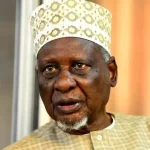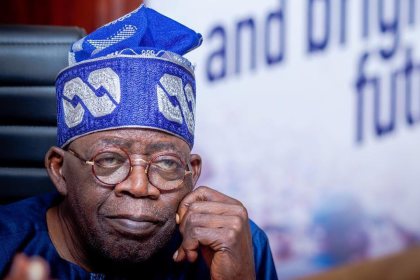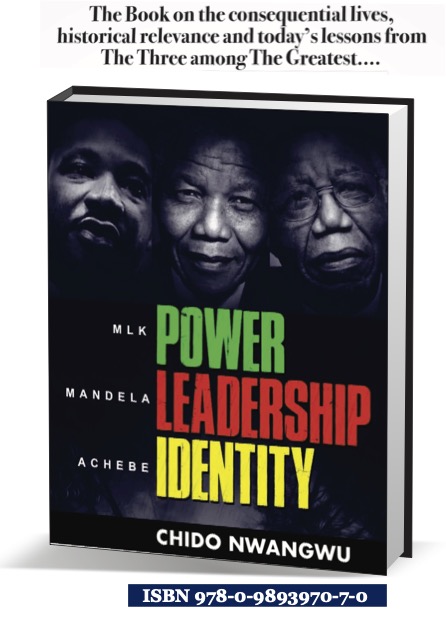Gen. Shehu Musa Yar’Adua’s prison death, Nigeria and The Ghost of Things to come …..
by Chido Nwangwu
Summary of this essay:
With the sudden prison death of the influential Katsina prince, former General and billionaire, Shehu Musa Yar’Adua, it should be in the interest of Gen. Sani Abacha’s regime to expedite action in determining the fate of late Yar’Adua’s former boss and former head of state of Nigeria, Gen. Obasanjo, currently in jail. Obasanjo is the only military head of state in Africa’s history to hand over power to a democratically elected, if imperfect government on October 1, 1979, to Alhaji Shehu Shagari. Also, Gen. Abacha and his men must contemplate, quickly and judiciously, how to avoid having detained millionaire businessman and presidential claimant, Moshood Abiola and Obasajo become additional ‘Yar’Aduas’ in their hands. It may not be pretty. Although, there are too many loudmouths shouting “Abiola” but few sustained, consequential efforts to secure his freedom. Worse, most of Obasanjo’s influential friends who are presidents and multinatinational corporate execs have all but forgotten about him. One thing that I do know as certain, rational and evident from history: no General profits from opening three zones of conflict, especially when the General is in transition. How Abacha, will handle the latest situation he has on his hands, especially the prison death of Yar’Adua, will soon be revealed on the canvass of time. But Abacha does not have the luxury of time on his hands.
The implications following the recent announcement by the Katsina Emirates Council, the traditional rulers’ council in the state, of the prison death (under the watch of the regime of Gen. Sani Abacha) of Gen. Shehu Musa Yar’Adua, former chief of army staff, vice-chairman of the Supreme Military Council of Nigeria and deputy head of State of Nigeria (from 1976 to 1979) are emerging daily.
First, many are bitter that if a former leader of the country and wealthy scion of a powerful family is not allowed adequate access to health services while in jail by his former assistants and juniors (now in command in the armed forces) what will be the lot of the so-called ‘ordinary’ Nigerians.
Second, the death which reportedly occured in the first week of December 1997 may serve as a rude awakening to many persons in his home state, and other activists across Nigeria. For millions of “Northerners”, especialy those from Yar’ Adua’s Katsina homeland, the sudden prison death of their son while he was still in jail by Gen. Sani Abacha’s government does not give Nigerians good reason(s) to send roses to the regime as it continues its promised march to civilian rule.
Third, the international community, especially Britain and the U.S., have failed, again, to stand up and be counted for any consequential action beyond the mere platitudes of expressing some puny diplomatic “concern” about “human rights in Nigeria.”
Fourth, the regime’s spokespersons had counted Yar’Adua, long before his prison death, as a good example of the “fearlessness” of the regime to detain and jail some of the so-called “untouchable heavyweights” in Nigeria. This sensitive turn of events will create more problems, domestically and internationally, about the human rights record of the military regime. The issue now will become, what happens to the health of other detained/jailed persons in the regime’s jails?
One of the regime’s most ardent critics and Nobel laureate for Literature Prof. Wole Soyinka had told me in an exclusive interview long before the death of Yar’Adua that “the dictatorship in Nigeria has no regards, at all, for human life. They have kept so many persons in jail under sub-human conditions. Their only crime remains the fact that they hold contrary opinions to armed thugs in power in Nigeria. I have repeatedly called on them to release these political prisoners….”
On his part, a diplomatic personage in Abuja, Nigeria’s new capital, expressed concern when he said to USAfrica The Newspaper’s reporter: “it’s really getting worrisome here…. I do not understand why the regime allowed things to degenerate to this level of having their own detainee, a former deputy head of state of Nigeria die from illness while in the army’s jail.” Another career diplomat who has been serving in Nigeria since 1994 cautioned “It’s not a good omen.”
A traditional ruler, Chief Henry Madumere who is currently visiting the U.S said during his courtesy call at the Houston editorial headquarters of USAfrica Media Networks that “it’s really unfortunate.” Madumere, 62 years old, and member of the defunct NCNC nationalist party in Nigeria in 1960s is very familiar with Shehu’s father. He told me “it’s not only unfortunate anyone has to die but the circumstances of Shehu Musa Yar’Adua’s death is even more unfortunate.”
Yar’ Adua, a 54-year old billionaire businessman and soldier, was opposed to Abacha’s regime especially before he was detained in 1994. Amnesty International had called the attention of the international community to the unhealthy conditions he was jailed (as well as retired Gen. Olusegun Obasanjo’s).
In his struggle for civilian rule, Yar’Adua was not merely another soldier-politician who made empty rhetorics. He actively and decisively sought his interests through heavy infusion of cash and campaign materials. He had the twin leverage of being a decisive, ambitious, prominent factor in politics and being well-placed during his career in the military. The political party he founded, the Social Democratic Party, SDP, was the platform through which Chief Moshood Abiola is “widely believed to have won” the June 12, 1993 elections as president. Abiola has been in jail, too. His health, according to his personal doctor, has been “less than satisfactory.”
Remarkably, many members of the U.S Black Congressional Caucus who benefitted from Abiola’s resources while he was doing business here in the U.S have long become mute over his condition. Or better put, additional influences and realities have set in to deflect their interests.
In 1994, Yar’Adua, at the time a partisan politician, sponsored a motion at a government-sponsored “constitutional conference” to force Gen. Abacha who had seized power through what has been described as a “palace coup” in November 1993 to hand over power to a democratically-elected government. His unprecedented motion was reversed.
Afterwards, he was arrested and convicted in 1995, by a panel instituted by Gen. Abacha’s regime for taking part in in a “coup plot” against the military government of Gen. Abacha. The regime was barely 18 months old. The allegation of their participation in the “coup plot” was reportedly made in a “conversation.” The officer who made the allegations which also “implicated” Obasanjo is reported to have admitted he made the charges and claims “under pressure.” Many felt a strong sense of betrayal and mischief because the officer is from the Yoruba ethnic group like the much-respected Obasanjo. Many international observers and local human rights activists condemned the trials as “nothing more than kangaroo trials” to silence those with the power and will to challenge Abacha.
Yar’Adua and Obasanjo’s sentence, treasonable felony, is a crime punishable by death. It was later commuted to 25 years in prison following an international outcry and appeals for clemency. Yar’ Adua was among the forty people convicted for the coup plot. Yar’Adua serving as deuty to Obasanjo became, on October 1,1979, the first Nigerian rulers to handover power to a democratically elected government, however imperfect the process.
According to Reuters, “until his arrest in 1995 for alleged coup plotting, Yar’Adua was regarded by political analysts as military ruler General Sani Abacha’s most formidable political opponent after detained presidential claimant Moshood Abiola.” His body has since been buried, according to Islamic rites, in his historic town of Katsina.
With the sudden prison death of Gen. Yar’Adua, it should be in the the interest of Gen. Abacha’s regime to expedite action in determining the fate of late Yar’Adua’s former boss and former head of state of Nigeria, Gen. Obasanjo, currently in jail. Obasanjo is the only military head of state in Africa’s history to hand over power to a democratically elected, if imperfect government on October 1, 1979, to Alhaji Shehu Shagari.
Also, Gen. Abacha and his men must contemplate, quickly and judiciously, how to avoid having detained millionaire businessman and presidential claimant, Moshood Abiola and Obasajo become additional ‘Yar’Aduas’ in their hands. It may not be pretty. Although, there are too many loudmouths shouting “Abiola” but few sustained, consequential efforts to secure his freedom. Worse, most of Obasanjo’s influential friends who are presidents and multinatinational corporate execs have all but forgotten about him. It’s really a pity!
I have never pretended to knowing what any four-star General is capable of doing under pressure. But one thing that I do know as certain, rational and evident from history: no General profits from opening three flanks of conflict, especially when the General is in transition. What and how Nigeria’s four-star General, Sani Abacha, will handle the current situation he has on his hands will only soon be revealed on the canvass of time. He does not have the luxury of time on his hands. Nigerians only hope he does what is moral and in Nigeria’s national interest.
December 8, 1997
-Chido Nwangwu, Founder & Publisher of USAfrica The Newspaper, USAfrica ONLINE ( https://usafricaonline.com ), and USAfrica WEEKEND publications based in Houston served as a member of the editorial board of the Daily Times of Nigeria. He also writes for the Oakland Tribune, Houston Chronicle, Christian Science Monitor, Post Express Lagos, Mail & Guardian of South Africa and a number of other publications in the U.S and Africa. 713-270-5500









